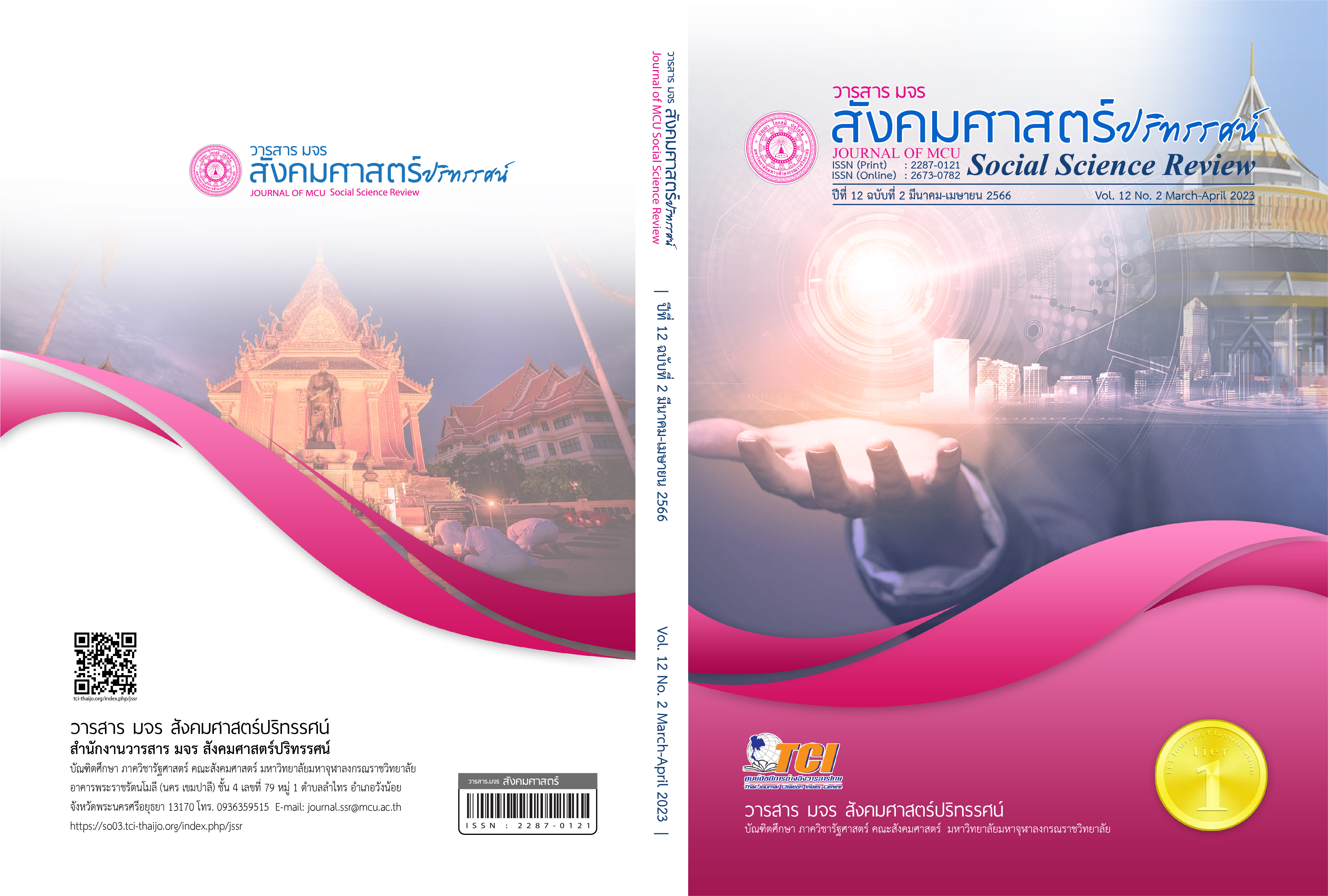รูปแบบการพัฒนาครูโดยใช้การประเมินแบบสะท้อนคิดที่มีผลต่อสมรรถนะครู ด้านการวัดและประเมินผลการเรียนรู้ระดับมัธยมศึกษา
คำสำคัญ:
สมรรถนะครู, การวัดและประเมินผลการเรียนรู้, การประเมินแบบสะท้อนคิดบทคัดย่อ
การวิจัยนี้มีวัตถุประสงค์ 1) เพื่อศึกษาสภาพปัญหาและความต้องการพัฒนาสมรรถนะครูด้านการวัดและประเมินผลการเรียนรู้ระดับมัธยมศึกษา 2) เพื่อพัฒนารูปแบบพัฒนาครูโดยใช้การประเมินแบบสะท้อนคิด ประชากรเป็นครูมัธยมศึกษาในภาคตะวันออกเฉียงเหนือ จำนวน 32,386 คน กลุ่มตัวอย่างเป็นครูมัธยมศึกษาในภาคตะวันออกเฉียงเหนือ จำนวน 480 คน จากการสุ่มตัวอย่างแบบกลุ่ม (Cluster Random Sampling) เครื่องมือที่ใช้ ได้แก่ 1) แบบสอบถาม (ค่าความเชื่อมั่น = .98) 2) แบบประเมินความเหมาะสมที่พัฒนาขึ้น สถิติที่ใช้ คือ ร้อยละ ค่าเฉลี่ย และส่วนเบี่ยงเบนมาตรฐาน
ผลวิจัยพบว่า 1. ครูผู้สอนระดับมัธยมศึกษามีปัญหาในภาพรวมด้านความรู้ความเข้าใจและด้านทักษะการวัดและประเมินผลการเรียนรู้ อยู่ในระดับมาก ( = 3.83, S = 0.88) และมีความต้องการพัฒนาในภาพรวมทั้งด้านความรู้ความเข้าใจและด้านทักษะ อยู่ในระดับมากเช่นกัน ( = 3.78, S = 0.82) 2. รูปแบบการพัฒนาสมรรถนะด้านการวัดและประเมินผลการเรียนรู้สำหรับครูระดับมัธยมศึกษาที่สร้างขึ้น ประกอบด้วย 6 องค์ประกอบดังนี้ 1) หลักการของรูปแบบ 2) วัตถุประสงค์ของรูปแบบ 3) เนื้อหาสาระการพัฒนา 4) กระบวนการพัฒนา 5) การวัดและประเมินผลรูปแบบ 6) แนวทางการนำรูปแบบไปใช้ และจากการประเมินของผู้เชี่ยวชาญ พบว่า รูปแบบและคู่มือการพัฒนาสมรรถนะในภาพรวมมีความเหมาะสม อยู่ในระดับมากที่สุด
เอกสารอ้างอิง
กฤติยา วงศ์ก้อม. (2547). รูปแบบการพัฒนาครูด้านการประเมินการเรียนรู้ตามแนวคิดการประเมินแบบเสริมพลังอำนาจที่สอดคล้องกับพระราชบัญญัติการศึกษาแห่งชาติ(วิทยานิพนธ์ครุศาสตร์ดุษฎีบัณฑิต). กรุงเทพฯ: จุฬาลงกรณ์มหาวิทยาลัย.
นิสดารก์ เวชยานนท์. (2559). Competency-Based Approach. กรุงเทพฯ: กราฟิโกซิสเต็มส์.
นงลักษณ์ วิรัชชัย. (2555). การกำหนดขนาดตัวอย่างและสถิติวิเคราะห์ใหม่ ๆ ที่น่าสนใจ. สืบค้น 20 มกราคม 2565, จาก http://lllskill.com/web/files/GPower.pdf
พิกุล เอกวรางกูร. (2550). การวิจัยและพัฒนาระบบการวัดและประเมินผลการเรียนรู้แบบบูรณาการระดับประถมศึกษา. (วิทยานิพนธ์ครุศาสตรดุษฎีบัณฑิต คณะครุศาสตร์). กรุงเทพฯ: จุฬาลงกรณ์มหาวิทยาลัย.
ไพรินทร์ ก้อนเพชร. (2551) ปัญหาการวัดและประเมินผลการเรียนรู้. สืบค้น 15 กุมภาพันธ์ 2565, จาก http://7pairin10.multiply.com/journal/
ข้อบังคับครุสภาว่าด้วยมาตรฐานวิชาชีพและจรรยาบรรณของวิชาชีพ พ.ศ. 2548. (2548, 5กันยายน). ราชกิจจานุเบกษา. เล่มที่ 122 ตอนพิเศษ 76 ง. หน้า 39-46.
สำนักงานเลขาธิการคุรุสภา. (2548). มาตรฐานวิชาชีพทางการศึกษา. กรุงเทพฯ: สำนักงานเลขาธิการคุรุสภา.
วณิช นิรันตรานนท์. (2552) รูปแบบการพัฒนาสมรรถนะครูผู้สอนกลุ่มสาระการเรียนรู้สุขศึกษาและพลศึกษาที่มีประสิทธิผลสำหรับโรงเรียนขนาดเล็กในเขตบริการของสำนักงานเขตพื้นที่การศึกษาอุดรธานี เขต 1. (วิทยานิพนธ์การศึกษาดุษฎีบัณฑิต). มหาสารคาม: มหาวิทยาลัยมหาสารคาม.
วิทยา จันทร์ศิริ. (2551). การพัฒนาสมรรถนะหลักของผู้บริหารสายสนับสนุนในมหาวิทยาลัยของรัฐในประเทศไทย. (วิทยานิพนธ์การศึกษาดุษฎีบัณฑิต). มหาสารคาม: มหาวิทยาลัย
วีระวัฒน์ ปันนิตามัย. (2544). ผู้นำการเปลี่ยนแปลง. กรุงเทพฯ: เอ็กซ์ปอเน็ท.
สมศักดิ์ ดลประสิทธิ์. (2559). สมรรถนะครูและผู้บริหารการศึกษา. วารสารการศึกษาไทย, 3(17), 11-13.
สุกัญญา รัศมีรรมโชติ. (2548). แนวทางการพัฒนาศักยภาพมนุษย์ด้วย Competency Based Learning. กรุงเทพฯ: ศิริวัฒนา อินเตอร์ปริ้น.
สำนักพัฒนาครูและบุคลากรทางการศึกษาขั้นพื้นฐาน. (2553). การพัฒนาสมรรถนะของครู ตามระบบการพัฒนาครูและบุคลากรทางการศึกษา. สืบค้น 5 มกราคม 2565, จาก http://www.nidtep.go.th/competency/content.htm
อังคณา ตุงคะสมิต. (2550). การพัฒนาระบบการวัดและประเมินผลระดับชั้นเรียนตามหลักสูตร การศึกษาขั้นพื้นฐาน พุทธศักราช 2544 โดยใช้การวิจัยเชิงปฏิบัติการแบบมีส่วนร่วม กรณีศึกษาโรงเรียนบ้านนาศรีดงเค็ง. (วิทยานิพนธ์การศึกษาดุษฎีบัณฑิต). กรุงเทพฯ: มหาวิทยาลัยศรีนครินทรวิโรฒ.
Wills, M. (1995). Managing the Training Process: Putting the Basic into Practice. London: McGraw-Hill.
Truelove, S. (1992). Handbook of Training and Development. Oxford: Blackwell.
ดาวน์โหลด
เผยแพร่แล้ว
รูปแบบการอ้างอิง
ฉบับ
ประเภทบทความ
สัญญาอนุญาต
ลิขสิทธิ์ (c) 2023 วารสาร มจร สังคมศาสตร์ปริทรรศน์

อนุญาตภายใต้เงื่อนไข Creative Commons Attribution-NonCommercial-NoDerivatives 4.0 International License.
เพื่อให้เป็นไปตามกฎหมายลิขสิทธิ์ ผู้นิพนธ์ทุกท่านต้องลงลายมือชื่อในแบบฟอร์มใบมอบลิขสิทธิ์บทความให้แก่วารสารฯ พร้อมกับบทความต้นฉบับที่ได้แก้ไขครั้งสุดท้าย นอกจากนี้ ผู้นิพนธ์ทุกท่านต้องยืนยันว่าบทความต้นฉบับที่ส่งมาตีพิมพ์นั้น ได้ส่งมาตีพิมพ์เฉพาะในวารสาร มจร สังคมศาสตร์ปริทรรศน์ เพียงแห่งเดียวเท่านั้น หากมีการใช้ภาพหรือตารางหรือเนื้อหาอื่นๆ ของผู้นิพนธ์อื่นที่ปรากฏในสิ่งตีพิมพ์อื่นมาแล้ว ผู้นิพนธ์ต้องขออนุญาตเจ้าของลิขสิทธิ์ก่อน พร้อมทั้งแสดงหนังสือที่ได้รับการยินยอมต่อบรรณาธิการ ก่อนที่บทความจะได้รับการตีพิมพ์ หากไม่เป็นไปตามข้อกำหนดเบื้องต้น ทางวารสารจะถอดบทความของท่านออกโดยไม่มีข้อยกเว้นใดๆ ทั้งสิ้น





